B2B SaaS SEO Guide - 10 Ways to Grow through Organic Search [proven]
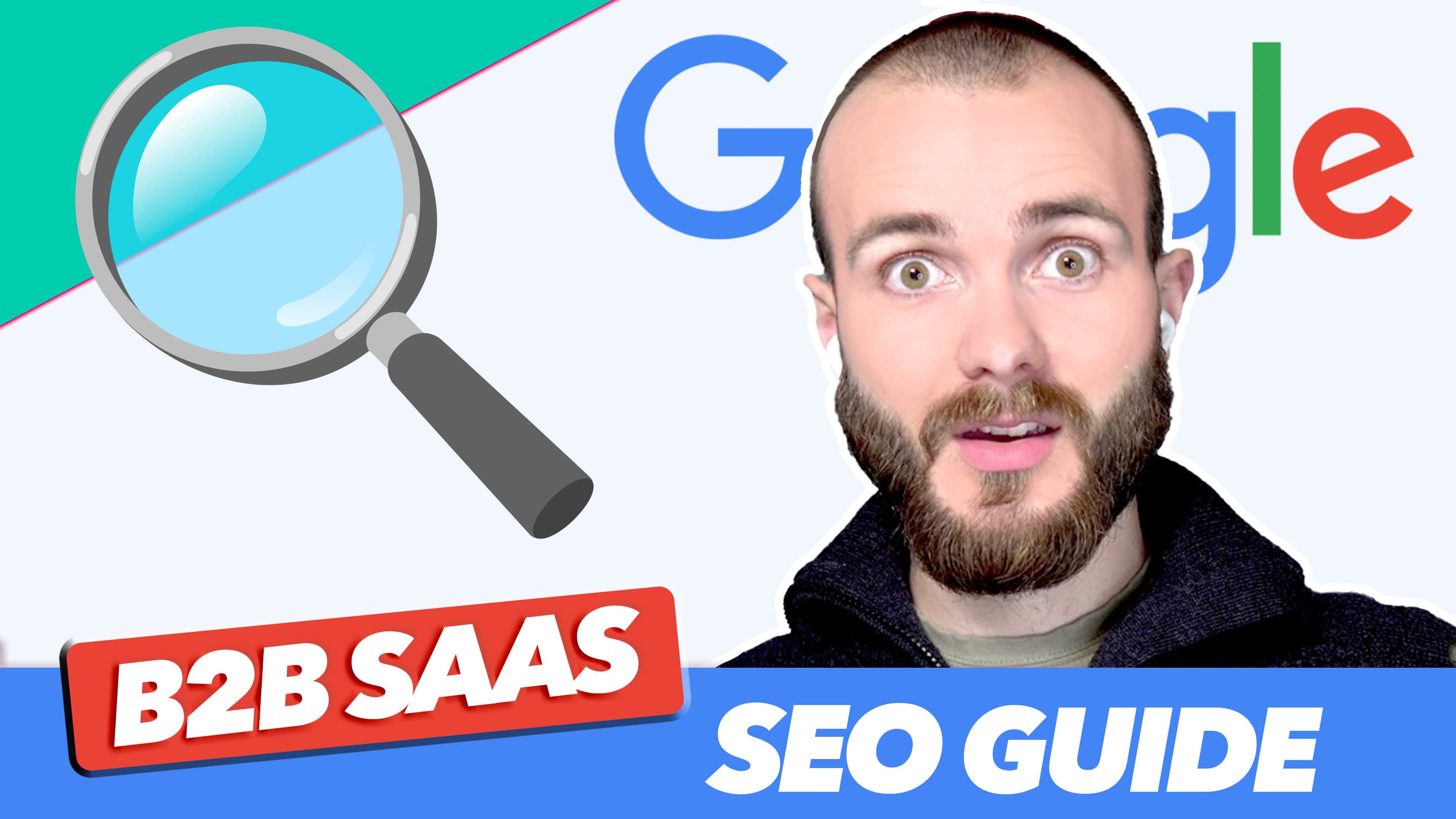
Contents
Make it to the top of the SERP (Search Engine Result Page) and grow your B2B SaaS organically using SEO. In this guide you will learn how to capture demand, tips on how to write content to please Google, and optimize to win the searches in your niche.
What is SaaS SEO?
SaaS SEO is the process of optimizing your SaaS website to improve its visibility and ranking on search engines like Google and Bing. To attract more organic traffic, leads and ultimately customers that are interested in the SaaS offering.
SaaS SEO, means 'Search Engine Optimization' work that is specifically benefitting SaaS companies. Here are a few benefits SaaS companies can get from SEO:
Attract high quality leads
Build thought leadership and awareness in your industry
Improve conversion rates by educating your target audience
Reduce your customer acquisition costs (CAC)
This work involves different SEO techniques - for example, keyword research (find what keywords drives the most ROI for your SaaS), technical SEO (optimize your SaaS website for Google's search engine, and make the UX superior), and building backlinks (get links back to your SaaS website).
3 reasons why SEO is a solid growth channel
Here are 3 reasons why SEO makes sense as a growth channel for your B2B SaaS - and why it's one of my favourite ones when it comes to growing a new startup.
It's cheap
Have high quality leads come to you - with intent and timing
Enjoy long-term growth
1. SEO is cheap
SEO does not cost a lot of money. Creating content is now easier than ever, with AI to assist your creative process and tons of skilled writers available at an instant through Upwork, and Fiverr.
Also, SEO allows you to reach the right prospects that are actively looking for solutions, which means you get a nice ROI on time spent on SEO.
2. SEO means high quality leads come to you
Applying SEO means you can have inbound leads come to you. These people are already looking to be educated on related topics, solve urgent problems, or find solutions that you provide with your SaaS.
Depending on your content, SEO can also help attract high-quality leads who are further down the sales funnel.
For example, by writing comparison articles, or targeting specific keywords with high-intent where you can convert prospects into customers.
3. SEO means long-term growth
SEO efforts compound over time, leading to big impacts, not just in website traffic, but inbound deal flow over time.
In 3 months, we went from 3000 impressions and 30 clicks (January) organically on Google in January - to 7300 impressions and 100 clicks (beginning of April).
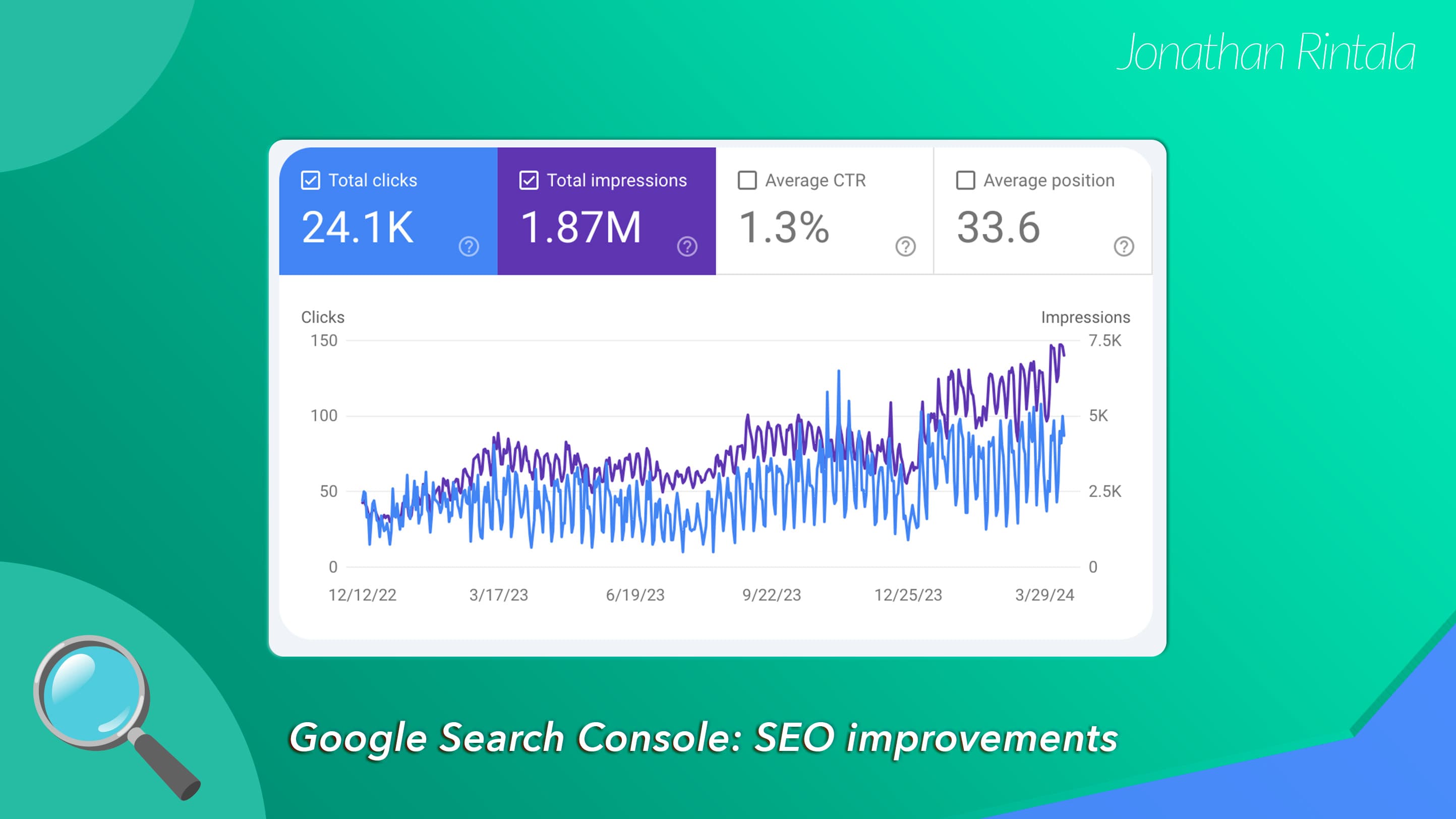
This results in a steady deal flow of demos and free signups to your SaaS, depending on what you optimize for.
Unlike traditional paid advertising, where you pay for each new impression or conversion, SEO primarily means an upfront cost (content production, keyword research, etc), and then website traffic i.e returns that compound over time.
3 drawbacks of SEO as a growth channel
A few drawbacks with SEO that you should consider when deciding on if SEO is the right growth channel to bring in to the mix for your SaaS:
It requires some technical skills and scrappiness
It takes some time - it's not overnight results, but rather a long-term growth investment that compounds over time
Ideally, there should be some existing demand to capture (else you will have to work more broadly on awareness and educating the market, which takes more time)
10 proven ways to grow through SEO as a SaaS
So, you have decided SEO might be a solid growth channel to bring into the mix for your SaaS. Here are 10 ways to grow through SEO as a SaaS company.
1. Set up keyword tracking and choose your SEO tools
To get started with SEO as a growth channel - you need some basic tools. Here are 5 of my favourites:
Google Search Console (free): a must have tool to A. manage your website (input your sitemap, re-crawl pages), as well as B. analyze how well your site performs - what keywords you rank for organically, what's your average engagement time for specific pages, or how well new content ranks. Also, you can find what pages are not being picked up by Google or returning errors - that you can then fix.
META SEO Inspector (free): a Chrome extension that allows you to run a SEO check for any website or page you visit. That can help you analyze competitors metadata, or simply check that your own site is presented as expected.
Semrush (>$129): a proper SEO tool to run keyword research, tracking, review backlinks, check your website's health and crawlability, as well as track your competitors - what keywords and content they rank for - and how they perform over time. I personally find Semrush slightly better when it comes to content planning and keyword research than Ahrefs, but would say they are very comparable.
Ahrefs (>$99): very similar to Semrush - a solid SEO tool to run keyword research, tracking, review backlinks, check your website's health and crawlability, as well as track your competitors.
Google Ads Manager (free): even though this is primarily a tool for running paid ads, you can use it as a FREE way to find out the search volume for keywords and their cost to rank for paid - ie. how "valuable" Google considers them to be - that can be helpful for organic keyword research. However, I personally can't stand the interface of Google Ads - it's clunky to say the least - so I would go for Semrush or Ahrefs if your budget allows it.
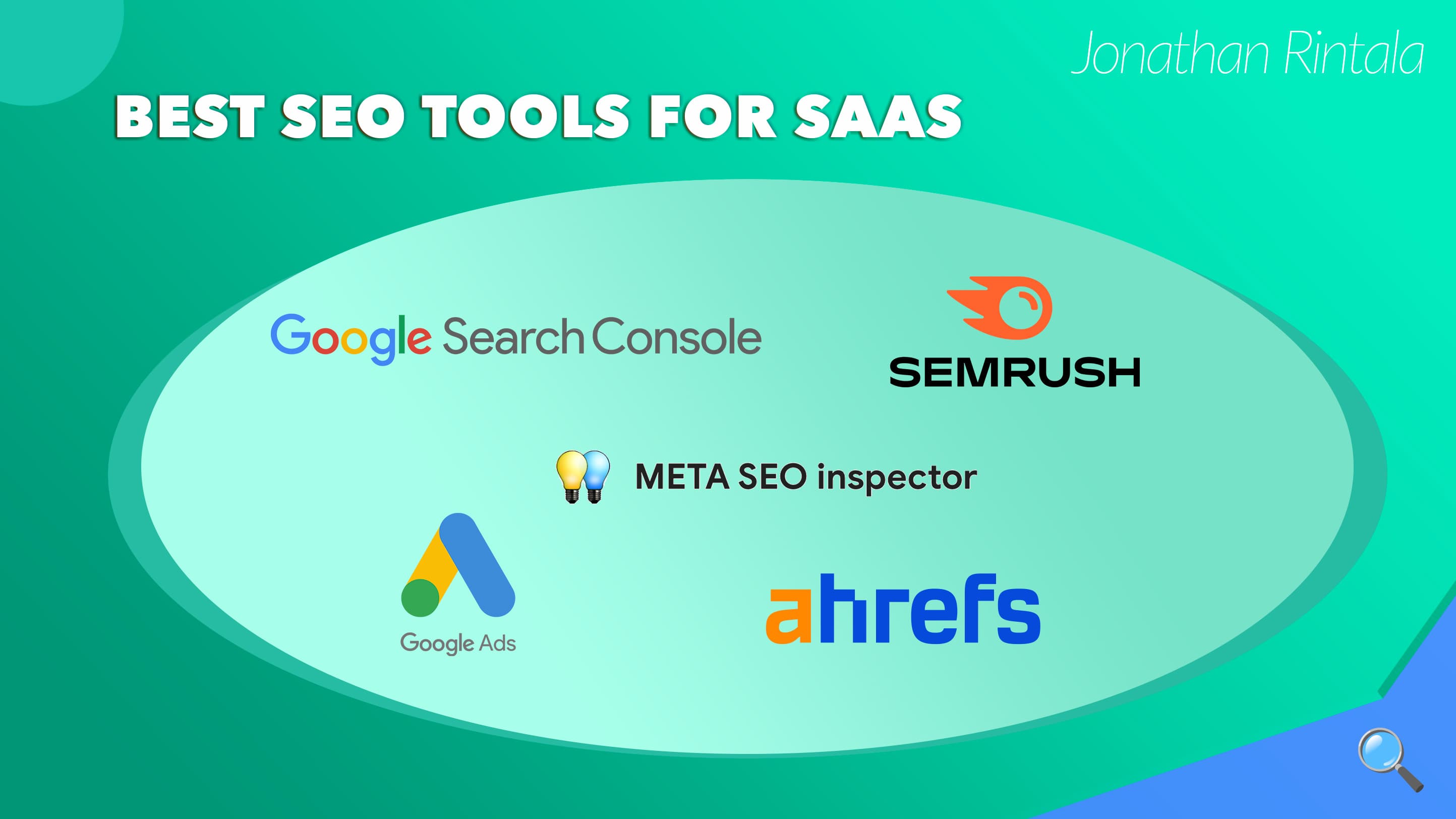
Best SEO tools for SaaS
Tool stack recommendation: I would start with Google Search Console, Google Ads Manager, and the free version of a either Semrush / Ahrefs. If your budget allows it, or you start to see traction from SEO - I would opt for either of the paid plans on Semrush/Ahrefs as a next step.
2. Lay the technical SEO foundation
To rank on Google you have to have a site that Google will be able to find and crawl, and decide is good enough for people to have a good experience visiting it.
This is done through laying a solid technical SEO foundation - making sure your site has:
Fast loading time - use Pagespeed to analyze and optimize for speed (use a fast and lightweight framework when you build if possible - I use Next.js). Aim for page speed > 90.
Metatags and structure - by tagging your content with OpenGraph, JSON-LD and similar - you will make it easy for Google to crawl and rank your pages and put them in featured snippets on the top of the SERP. I use the NPM-package next-seo here.
Sitemap - create a sitemap to tell Google about all of your content, when it was last updated, etc. and you will optimize your changes to rank. If you use Next.js run something like next-sitmap, to do this dynamically.
Accessibility - mobile responsiveness and general accessibility will affect the user experience. Thus, Google takes this into account when ranking your site.
Content and keyword plan - plan out your content with pillar pages for the big and difficult keywords you want to rank for, and to avoid keyword cannibalization.
3. Backlinks matter - find a repeatable way to get them
So getting external websites to link to your SaaS website is key - even better if the external websites have are trustworthy with A. high authority and B. high traffic - think the big newspapers Techcrunch, NY Times, Yahoo Finance, for example. That's why PR will also be an efficient way to boost your site in the long-run.
Also, getting backlinks from websites in your niche is extra valuable for you to rank - as they will give you that sweet Topical Authority - some benefits we will talk more about in (5).
How do I get backlinks for my SaaS?
Getting backlinks is not straight-forward - as it is one of the only things you cannot control yourself. Someone else has to decide your content is good enough to link to. However, here are some popular ways to get backlinks:
Cold email sites in your niche for guest posting or backlink exchange
Build free tools
Put together articles with lots of stats in them
Have your customers link to your stories and case studies
Find dead backlinks of competing sites (using Semrush/Ahrefs)
A powerful way (that might not be possible for all SaaS) is to build in a backlink aspect into your SaaS product - so customers will naturally link to you when they use your product. For example, G2 and others do this with their badges.
4. Start in your ICP, rather than search volume
Rather than obsessing about search volume - zoom in on your ideal customer persona (ICP) and map out all the questions they might have, what problems they are looking to solve, and what use-cases they will look into.
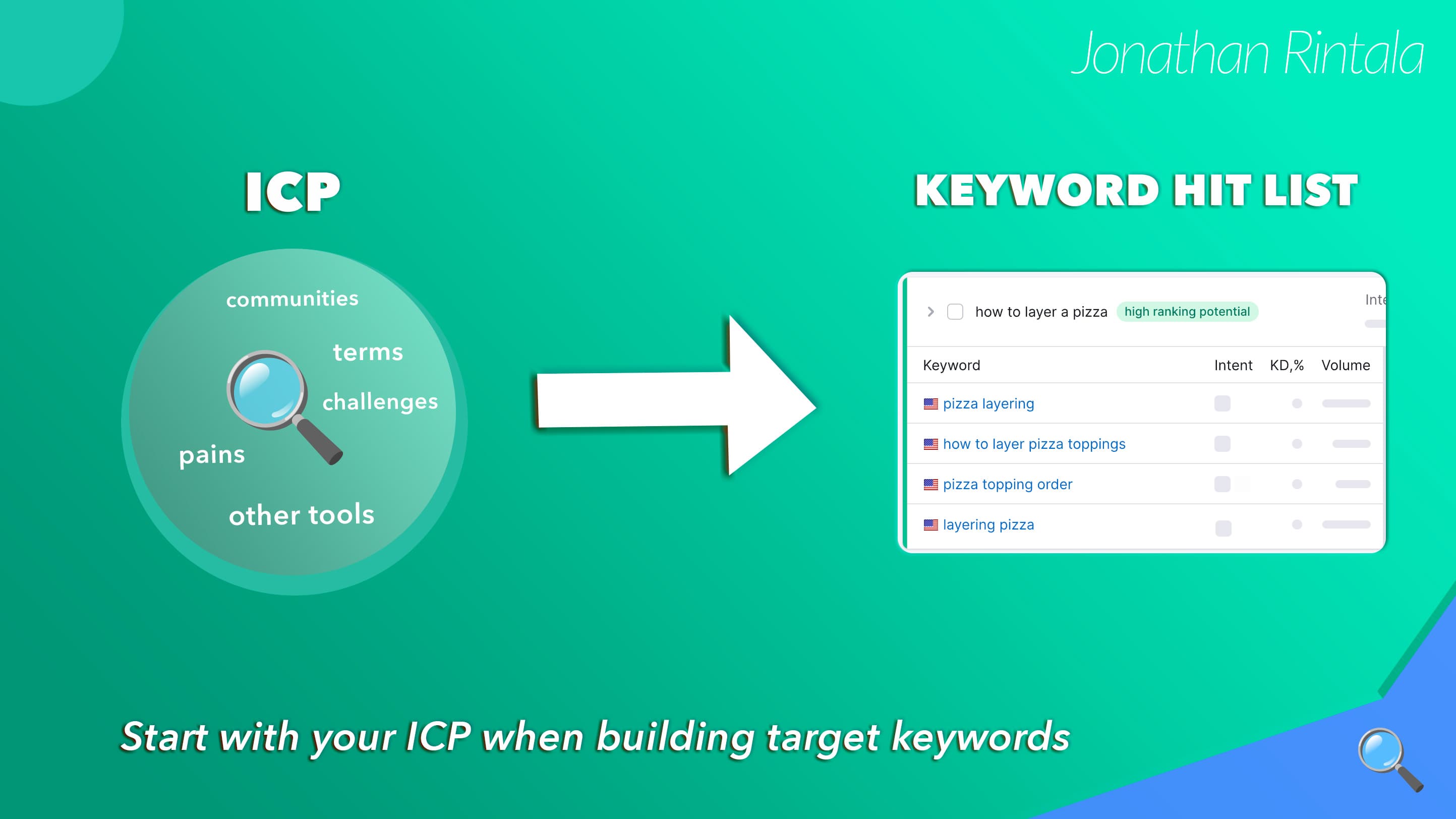
Keyword planning - start with your Ideal Customer Profile (ICP) when building your keyword list
By starting in ICP you will make sure to create real value for your potential buyers and build topical authority in your niche. Also, you will capture traffic from valuable long-tail keywords that might not even show up in keyword research.
5. Own your niche - gain Topical Authority
What is Topical Authority?
Simply put - Topical Authority (TA) can be defined as the importance of a site in its niche.
How do you gain Topical Authority?
You get high TA in your niche from Google by doing three things:
Posting consistent quality content within the niche
Having relevant and trustworthy backlinks from other sites in the industry
Have a site of good technical SEO quality - no broken pages, fast loading time, etc.
Why does Topical Authority matter?
With a high Topical Authority, Google will A. index you fast and B. rank you high up on the SERP for relevant keywords in your niche.
6. Write 10X content, not just filler posts
This might sound trivial, but it is a hugely important mental shift that I struggled with initially myself - as I got into SEO and content production. It was realizing that The Power Law applies to producing content for SEO as well.
Instead of just thinking:
❌ DON'T: "how can I produce as many blog posts as possible in 2 weeks - I need to fill out my empty blog and quickly cover all topics my ICP is interested in"
✅ DO: "how can I create 1-2 blog posts or tools that my ICP will LOVE reading and will want to A. bookmark, B. share to their colleagues, friends, or C. link to from their site"
Once you start putting out 10X content pieces, the backlinks will start coming in, average engagement time will be high, and ICP prospects will convert. One or a few of these can do magic to your site - as Google will both rank your articles high and quickly award you with Topical Authority.
HubSpot and others have preached this for a long time - putting out really valuable content that will be worth bookmarking, shooting over to a colleague in Slack, or referring in your articles. Often these posts are research based like the "The Ultimate List of Marketing Statistics for 2024" which is something you would WANT to link to.
7. Go beyond text - build tools, glossaries, alternatives pages
To get backlinks you need content that your ICP finds to be 10X what they are used to - content that truly answers their question they had when they searched on Google.
A great way to do this is to go beyond just text posts. Instead focus on more dynamic content such as infographics, videos, or free tools.
A popular and super simple free tool I created for marketers that run webinars - is a free polls question generator. That is something that creates much higher average engagement time than a theoretical article - and can be used by our ICP each time they want to host or plan out a webinar.
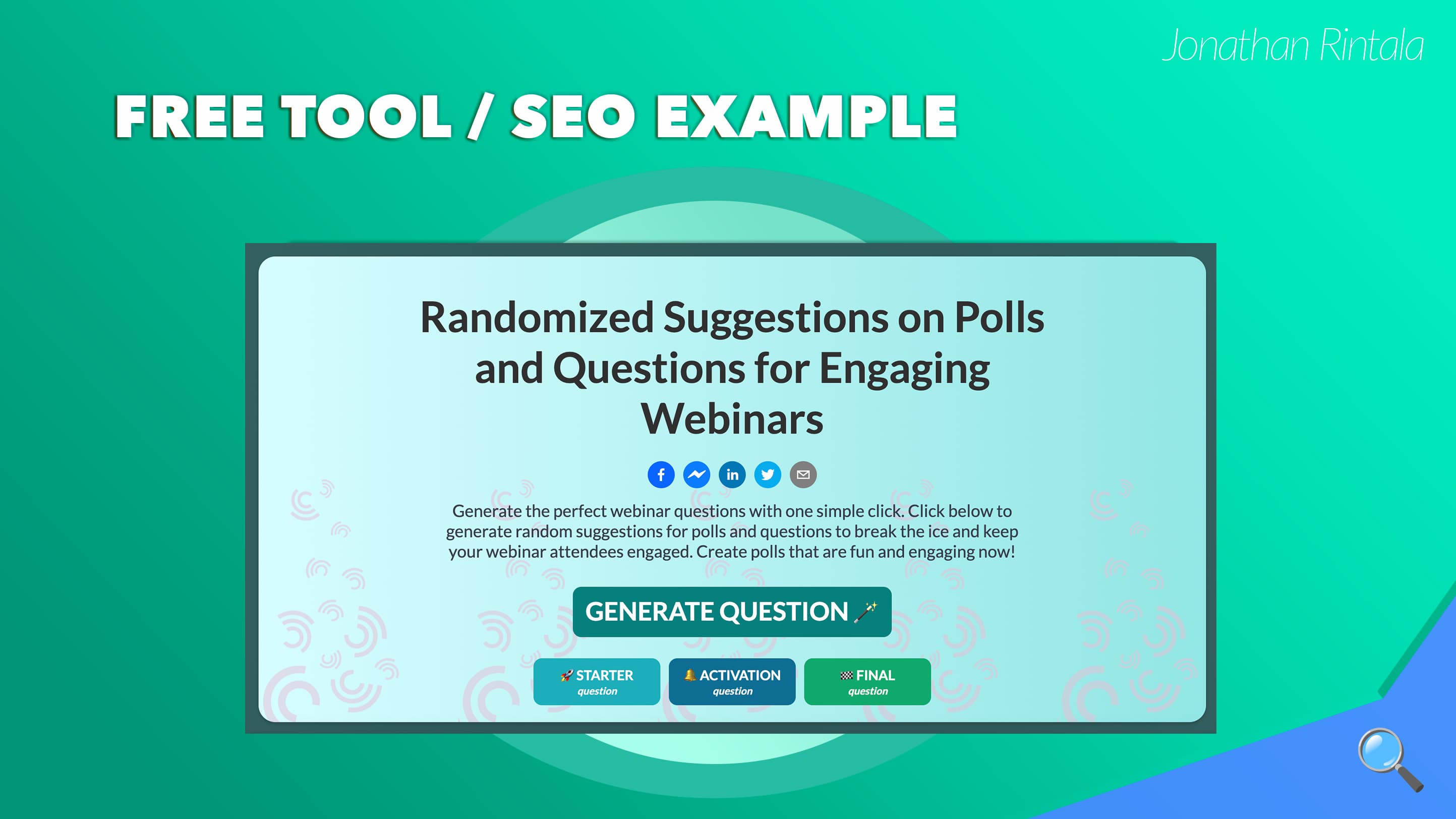
Using free tools as a SEO magnet - Example of polls generator
Comparison pages can also be a great way to rank for high-intent keywords of competitors' such as "competitor X alternative" - something SaaS company Podia has mastered.
I have also had nice success with glossaries, that you can build from the ground up to answer all the terms your ICP can potentially need to know when working in their space - and you will get a broad base to capture alot of search volume. See the webinar glossary example below under (8).
8. Nail internal linking
Your internal links are important to give link juice to the important pages on your site (to rank them higher) and give your website visitors a good UX.
Make sure you add internal links as you create new content, and link to your pillar pages from all of your relevant blog posts, tools, and product sites.
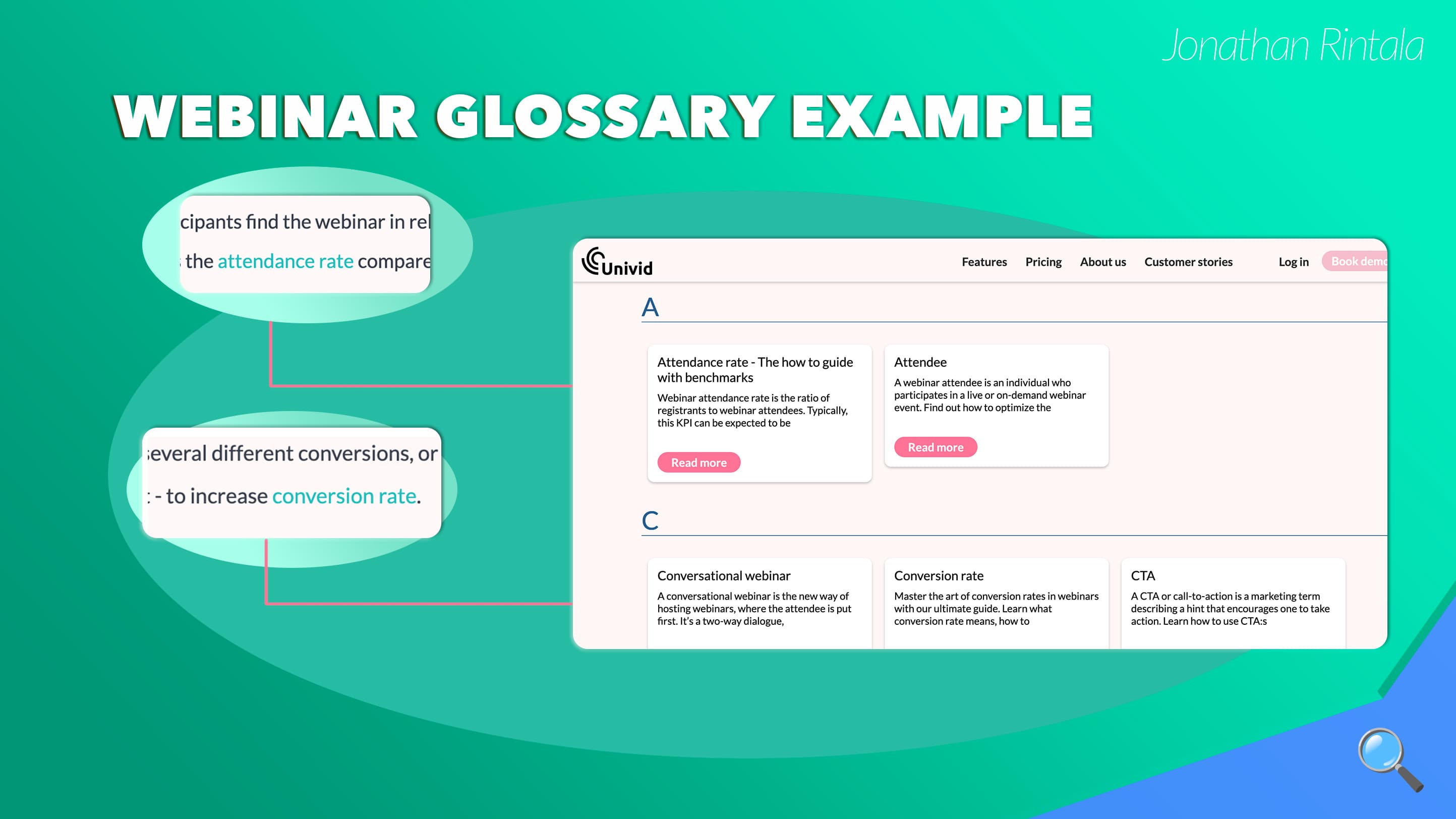
For example, with Univid I created a webinar glossary with a ton of relevant webinar terms, which we link to as we mention them in the other blog posts and content.
9. Use AI wisely - build structure
AI is changing content for ever. Google follows the E-E-A-T formula (Experience, Expertise, Authoritativeness, and Trust) and says they won't punish AI created content, as quality content is all that matters. However, in practice - a lot of sites have issues ranking when going to hard on AI content.
My recommendation is to be careful with how you apply AI content as it can easily fall into the "low-quality" bucket where you basically just shoot out AI text that could rather have been viewed directly inside of ChatGPT. Why would anyone visit your site specifically? What additional value do you provide?
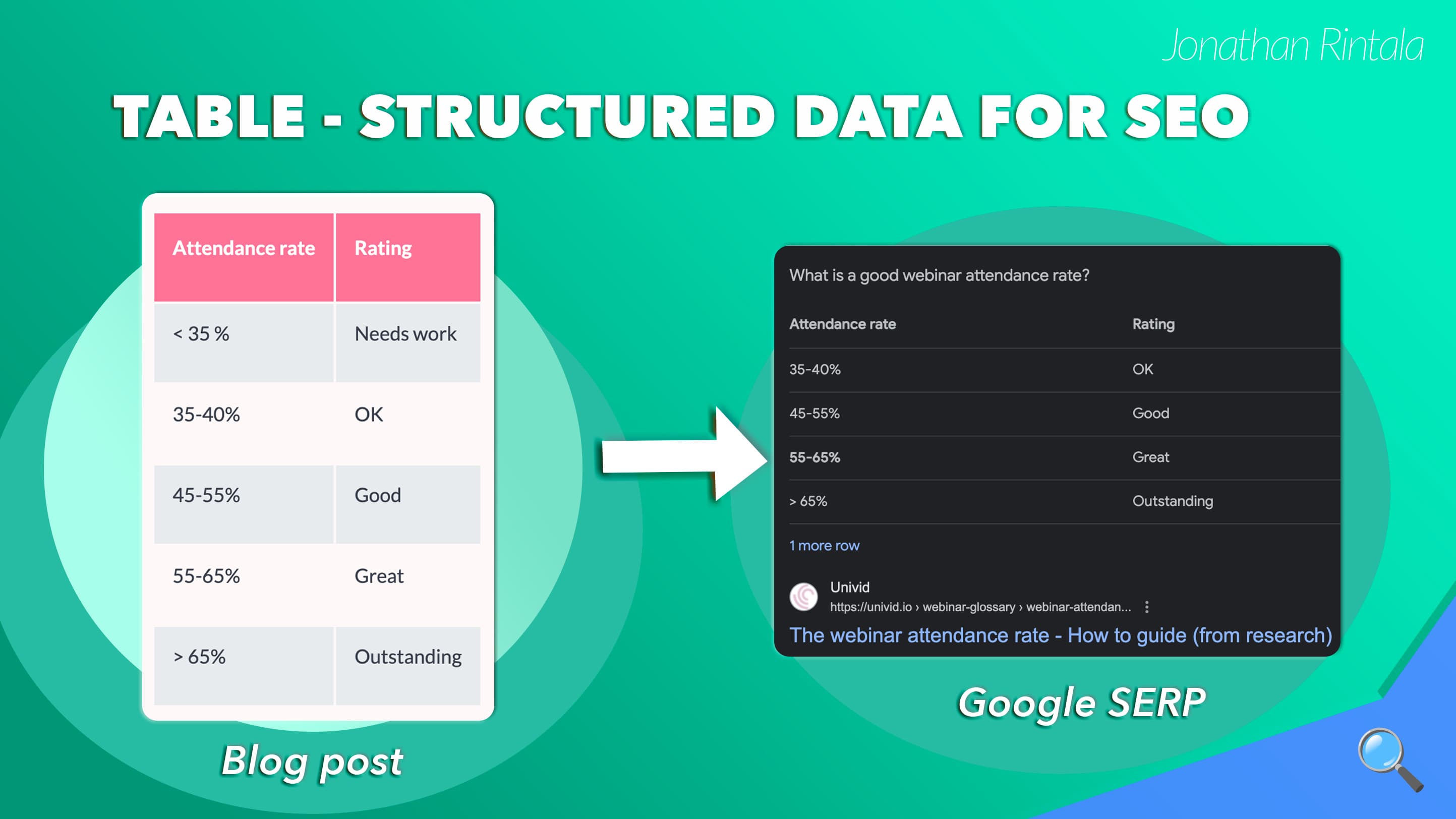
I like to use AI to create structure for articles, or produce a write up of certain sections, that I can then rewrite and add "value nuggets" to - to make the content 10X for my ICP. Also, adding videos, illustrative images, and structured data such as tables is awesome to make the content stand out and get those featured snippets (highest up on the SERP).
10. SEO is not only Google anymore - use Youtube, Reddit, etc.
Google is the king and will be for a foreseeable time when it comes to search. However, search is also shifting towards the AI engines such as ChatGPT, as well as communities and social medias where people look for transparent answers by their peers. Here are a few alternatives to consider
AI platforms like ChatGPT, Google Search Generative Experience (SGE), etc.
With the AI revolution, the traditional SERP as we know it today, will change alot. Platforms like ChatGPT, where prompts return results directly in their tools, and also with Google incorporating AI generated search results with GSE - means you should consider optimizing not just for traditional search on Google.
Youtube and video SEO
Youtube is owned by Google and will be prioritized amongst search results for a lot of queries - without requiring an SEO optimized website or any fancy backlinks.
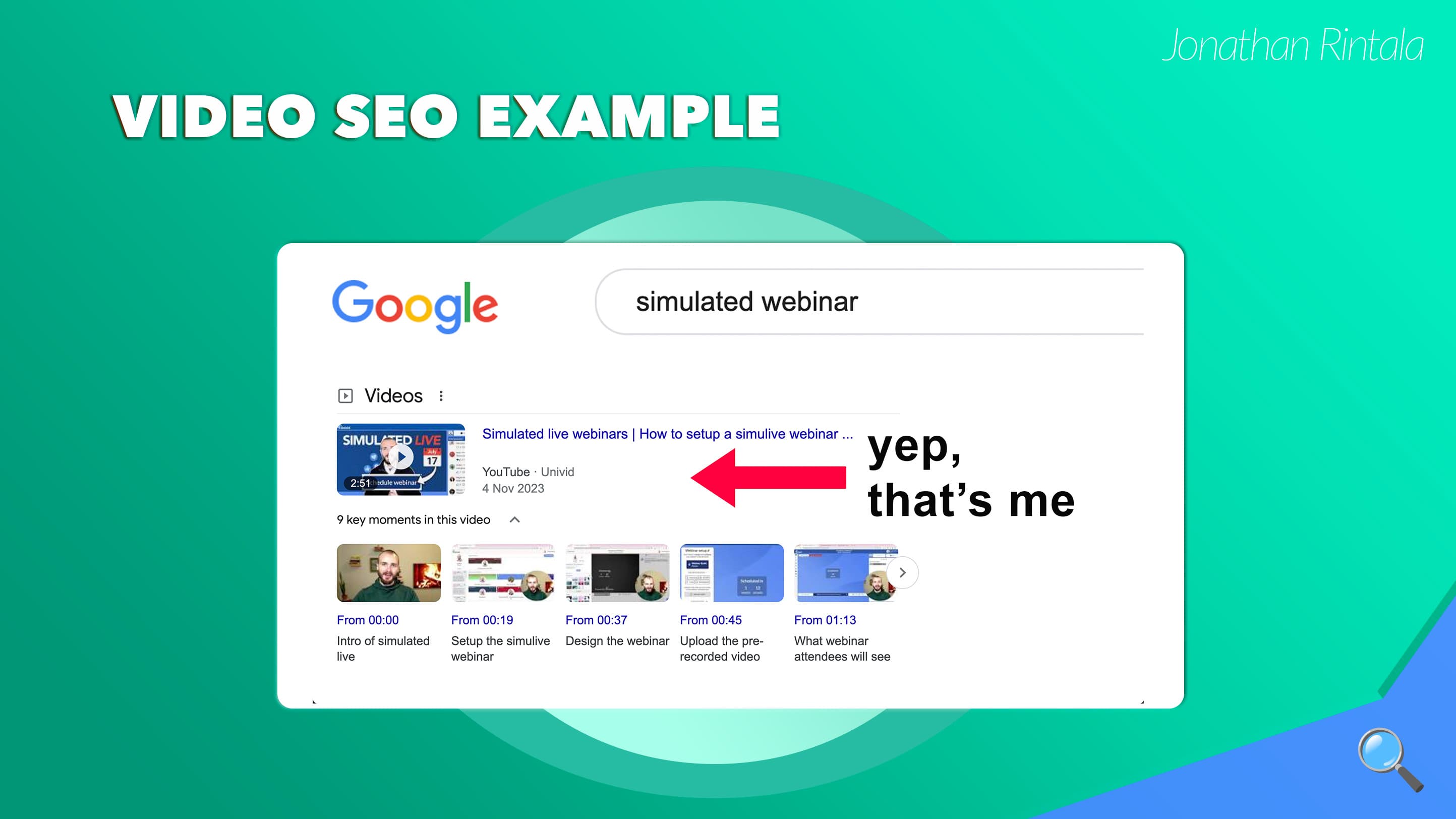
Video SEO example - Rank on the SERP with Youtube videos
Video SEO means you optimize metadata - such as video title, description, hashtags, thumbnails, and transcriptions - to show up for your target keywords on both Youtube and Google. You can also add a new page on your website for each new video, together with a repurposed text - or enrich existing blog posts with your interactive video content.
Reddit and communities
Reddit went public in 2024 and has a huge community where peers refer SaaS solutions, help each other solve problems, etc. Thus, having a presence in communities like Reddit where people hang out and look for transparent recommendations is key.
After Google's March update 2024 - search results from Reddit are increasingly prioritized on the Google SERP now as well. So make sure to be active in the right subreddits and answer relevant questions to make your SaaS searchable and public also on Reddit.
TikTok
Also, with Gen Z increasingly starting to use social media platforms like TikTok to search for news, clothes, and software - you should consider buyers searching on these platforms as well - depending on your ICP. Generally short form video suits more consumer type of SaaS, that typically correlates with a lower ACV (annual contract value) and PLG approach.
Conclusion
SEO can be one of the most efficient and powerful growth channels for SaaS if done right. By using AI tools, setting up some fundamentals, and starting writing content that your ICP will want to bookmark and share - you can easily create a long-tail growth engine that compounds over time. SEO done right - can give you an inbound flow from active buyers on the hunt for a solution like your SaaS.
Want to learn more about growing SaaS companies?

